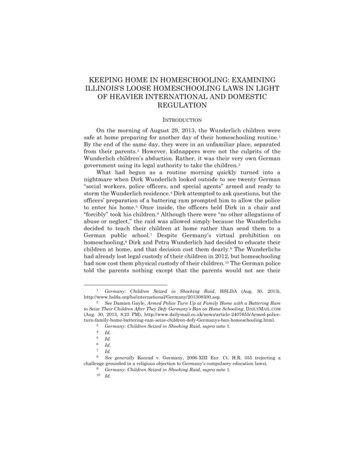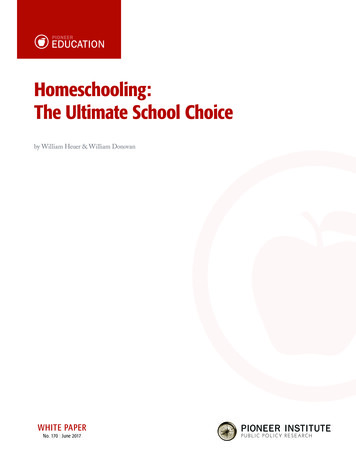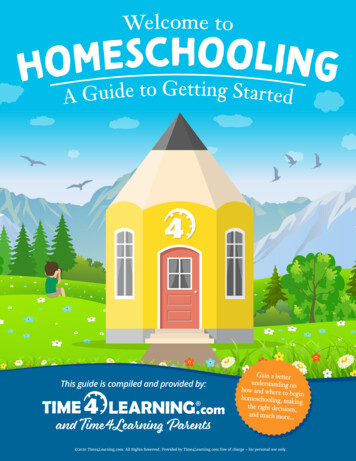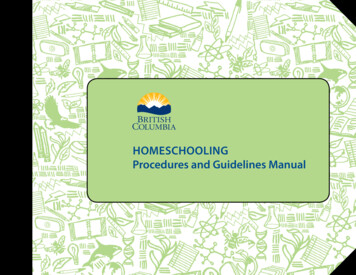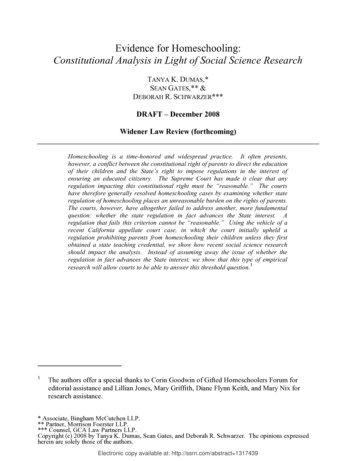
Transcription
Evidence for Homeschooling:Constitutional Analysis in Light of Social Science ResearchTANYA K. DUMAS,*SEAN GATES,** &DEBORAH R. SCHWARZER***DRAFT – December 2008Widener Law Review (forthcoming)Homeschooling is a time-honored and widespread practice. It often presents,however, a conflict between the constitutional right of parents to direct the educationof their children and the State’s right to impose regulations in the interest ofensuring an educated citizenry. The Supreme Court has made it clear that anyregulation impacting this constitutional right must be “reasonable.” The courtshave therefore generally resolved homeschooling cases by examining whether stateregulation of homeschooling places an unreasonable burden on the rights of parents.The courts, however, have altogether failed to address another, more fundamentalquestion: whether the state regulation in fact advances the State interest. Aregulation that fails this criterion cannot be “reasonable.” Using the vehicle of arecent California appellate court case, in which the court initially upheld aregulation prohibiting parents from homeschooling their children unless they firstobtained a state teaching credential, we show how recent social science researchshould impact the analysis. Instead of assuming away the issue of whether theregulation in fact advances the State interest, we show that this type of empirical1research will allow courts to be able to answer this threshold question.1The authors offer a special thanks to Corin Goodwin of Gifted Homeschoolers Forum foreditorial assistance and Lillian Jones, Mary Griffith, Diane Flynn Keith, and Mary Nix forresearch assistance.* Associate, Bingham McCutchen LLP.** Partner, Morrison Foerster LLP.*** Counsel, GCA Law Partners LLP.Copyright (c) 2008 by Tanya K. Dumas, Sean Gates, and Deborah R. Schwarzer. The opinions expressedherein are solely those of the authors.Electronic copy available at: http://ssrn.com/abstract 1317439
1I.PARENTS’ RIGHTS AND STATE INTERESTS .3II.WHY AND HOW FAMILIES HOMESCHOOL .5A.B.III.1.The History Of Homeschooling .62.Parents Have Many Reasons For Homeschooling .8Homeschooling Allows Parents To Tailor The Educational MethodsAnd Materials To Best Fit Their Child’s Educational Needs 91.Families Use A Variety Of Homeschooling Methods 92.Homeschooling Parents Have Access To A Rich Variety ofLearning Materials And Opportunities.10RESEARCH DEMONSTRATES THAT HOMESCHOOLING SERVES THESTATE’S INTEREST IN EDUCATION .12A.IV.Americans Have Homeschooled For Decades For A Variety OfReasons .6Studies Show That Homeschooled Students Succeed Academically 131.Homeschooled Students Perform Better Than ConventionallyEducated Students On Standardized Academic AchievementTests .142.Homeschooled Students Perform Well Regardless Of Race OrSocio-Economic Status .153.Colleges And Universities Have Recognized The Efficacy OfHomeschooling And Recruit Homeschooled Students174.Homeschooled Students Perform Well In College .185.Homeschooling Offers Effective Educational Opportunities ForStudents With Learning Differences .20B.Studies Demonstrate That Homeschooled Students Are Well Socialized.21C.Homeschooled Students Are Active Leaders And CommunityParticipants, As Well As Desirable Employees.24DATA SHOW THAT THE ACHIEVEMENT OF HOMESCHOOLEDSTUDENTS IS NOT RELATED TO THE LEVEL OF STATEREGULATION.26Electronic copy available at: http://ssrn.com/abstract 1317439
A.Studies Show No Correlation Between A Parent’s Being CredentialedAnd Student Achievement.27B.Increased State Regulation Does Not Correlate With IncreasedAchievement Of Homeschooled Students.28C.V.1.A Majority Of States Impose No Minimum Qualifications OnHomeschool Parents; None Requires A Credential .292.Only Half Of The States Require Any Formal Assessment OfHomeschooled Students.313.Very Few States Require Additional Regulation.31Changes In Interpretation Or Application Of Compulsory EducationLaws Would Have Widespread Negative Effects And Would ViolateParents’ Consitutional Rights .32CONCLUSION.33
INTRODUCTIONA primary goal of modern American society is to ensure that every child receive anappropriate education. Well-educated children are much more likely to become productive andengaged citizens. In furtherance of this goal, every state of the Union has adopted some variation oflaws requiring children to attend school or to be educated. The power of the states to mandatecompulsory education is, subject to certain limitations, generally accepted and recognized indecisions of the United States Supreme Court.While the states may compel the education of children, parents have a fundamental role indeciding how it should be done in their family. The ability of parents to direct the upbringing andeducation of their children is a fundamental right. Accordingly, regulations adopted by a State tofurther its compelling interest in education can conflict with these parental rights.As the Supreme Court famously noted, “The child is not the mere creature of the State; thosewho nurture him and direct his destiny have the right, coupled with the high duty, to recognize andprepare him for additional obligations.”2 State compulsory education laws, for example, cannotrequire compulsory attendance only at public schools. The State must allow for alternatives. TheState may, however, regulate these alternatives. The proper balance between the interests of thegovernment and the family has been developed in a line of cases from the Supreme Court, whichbroadly establishes that States may only subject parents’ rights to guide the education of theirchildren to “reasonable” regulation that promotes the State’s interest in education.Courts deciding whether a State’s regulation of education is “reasonable” all too often fail toask a key question. They examine the burden placed by the State regulation on the parents’* Associate, Bingham McCutchen LLP.** Partner, Morrison Foerster LLP.*** Counsel, GCA Law Partners LLP.Copyright (c) 2008 by Tanya K. Dumas, Sean Gates, and Deborah R. Schwarzer. The opinions expressedherein are solely those of the authors.
Widener Law Review (forthcoming)2exercise of the right to direct the education of their children. Almost universally missing from thiscase law, however, is any analysis of a more fundamental, even threshold issue: whether particularregulations affecting the right of parents to direct their children’s education in fact achieve theState’s interest in education. If these regulations do not serve the State interest, they are bydefinition unreasonable.The failure to address this fundamental issue is especially apparent in cases involvinghomeschooling. When courts are asked to determine whether homeschooling complies with aState’s compulsory education laws, the interplay between the fundamental right of parents tocontrol the upbringing and education of their children and the State’s interest in the education of itscitizens is brought into sharp focus. An extensive body of federal and state decisions, sometimesconflicting, examines whether various state educational regulations of homeschooling arepermissible in light of parental interests. Yet the courts rarely examine whether the regulation atissue actually advances the State’s interest. Instead, the courts have simply ignored or assumedaway this question.By examining one such regulation – the requirement of homeschool parents to obtain ateaching credential – we show how recent social science research impacts the analysis. Thisresearch answers three underlying questions: Why do parents seek to homeschool? Doeshomeschooling achieve the goals that underlie the State’s interest in education? And, does aregulation that significantly curtails homeschooling advance the State’s interest?(Footnote Continued from Previous Page.)2Pierce v. Society of Sisters, 268 U.S. 510, 535 (1925).
Evidence For Homeschooling3We begin in Part I by exploring the scope of sometimes overlapping and sometimesconflicting parental rights and state interests in education. Part II addresses the first question ofwhy parents seek to homeschool, by acknowledging the apparent distrust, held by many courts andmany Americans, of homeschooling parents’ motivations. In response to those concerns, wepresent research showing that parents homeschool for a variety of reasons that are consistent withthe State’s interest of providing an adequate and appropriate education for individual children. PartIII answers the question of whether homeschooling achieves the goals underlying states’ interests ineducation. Many are skeptical that is does. But the empirical evidence analyzed in part III showsboth that homeschooling is highly effective and that it produces well educated, well socialized,engaged citizens. In Part IV, we begin to address whether a credentialing regulation would advancethe State’s interest in education. There, we examine additional empirical evidence and studies thattend to show that the achievement of homeschooled students is not related to the level of stateregulation. This evidence shows that credentialing regulations severely burden parents’fundamental rights while failing to advance the state interest.Based on the survey of evidence, we conclude that a credentialing regulation that wouldeffectively prevent most parents from teaching their own children -- a practice that furthers theStates’ interests in education -- is contrary to the States’ common interest in ensuring that allchildren are well educated, would be an unreasonable regulation, and would therefore violateparents’ constitutional rights.I.PARENTS’ RIGHTS AND STATE INTERESTSThe Supreme Court has made it clear that parents have a fundamental, constitutional right todirect the education of their children. In fact, the “interest of parents in the care, custody, andcontrol of their children” – which includes the right “to control the education of their own” – is
4Widener Law Review (forthcoming)“perhaps the oldest of the fundamental liberty interests recognized by [the] Court.”3 In light of thisright, States may only impose “reasonable” regulations on parental educational decisions, and theCourt has struck down state statutes that prevented parents from engaging an instructor to teachtheir children a foreign language,4 required all children not homeschooled to attend public school(thus precluding private schooling),5 or effected too much public control over private schooladministration and curriculum. 6 From these cases comes the general principle that although theState has an important interest in ensuring that children are educated, the means by which the Statemay achieve that interest are bounded by the constitutional rights of parents.In recent years, these parental rights and the State’s interest in education have come to theforefront in the area of homeschooling. Courts have recognized that parents have a constitutionallyprotected right to homeschool their children.7 With varying outcomes, courts have addressed thepropriety of a number of state regulations affecting homeschooling.8 In these cases, the courts haverepeated, mantra-like, that the State has a compelling interest in the education of its citizens. But3Troxel v. Granville, 530 U.S. 57, 65 (2000) (plurality opinion).4See Meyer v. Nebraska, 262 U.S. 390, 399-402 (1923).5See Pierce, 268 U.S. at 530, 534-35.6See Farrington v. Tokushige, 273 U.S. 284, 295 (1927).7See, e.g., Peterson v. Minidoka County School Dist., 118 F.3d 1351, 1358 (9th Cir. 1997)(school district’s adverse employment action based on public school principal’s decision tohomeschool his children violated principal’s constitutional rights).8See, e.g., Murphy v. Arkansas, 852 F.2d 1044 (8th Cir. 1988) (upholding testing requirement);Combs v. Norwin School Dist., 468 F. Supp. 2d 738 (W.D. Pa. 2006) (upholding minimumattendance days and hours of instruction in certain courses, review of logs and materials byschool district); Null v. Bd. of Ed., 815 F. Supp. 937 (S.D. W.Va. 1993) (upholding testingrequirement); Brunelle v. Lynn School Dist., 702 N.E.2d 1182 (Mass. 1998) (striking downhome visit requirement); Care & Protection of Charles, 504 N.E.2d 592 (Mass. 1987) (priorreview of educational plan).
Evidence For Homeschooling5notably absent from this case law is an examination of why parents choose to homeschool, whetherhomeschooling is effective, and whether the regulation at issue actually advances the State interest.Instead, courts seem content with unsupported assertions.9 For instance, in a later vacated decision,the California Court of Appeal reasoned that requiring homeschool parents to obtain a teachingcredential would be a reasonable regulation of parents’ constitutional rights because the regulationmight be related to a State interest in supervising homeschooling.10 As the evidence analyzed in thisarticle illustrates, however, the interests at stake are too important to fail to address these issues. Ifunregulated homeschooling by uncredentialed parents were not leading to successful studentoutcomes, the States’ interest in education would compel a change. If, however, homeschooling byuncredentialed parents is turning out well-educated, well-adjusted children who are becomingproductive citizens, then any regulations that would curtail the practice would seem to be counter tothe States’ interests.II.WHY AND HOW FAMILIES HOMESCHOOLReading between the lines of judicial opinions dealing with homeschooling, it seems thatmany courts approach homeschooling with a degree of suspicion. Some believe that parents’motives for homeschooling are not aligned with the state interest in education. Others doubtwhether homeschool parents have the resources and means to teach effectively. Like any bias, these9Compare People v. Bennett, 501 N.W.2d 106, 117 (Mich. 1993) (upholding teachingcertification requirement without any evidence that the regulation actually advances the stateinterest but rather asserting, “Teacher certification can measure, and to some extent ensure, theminimum qualifications of each teacher. Certification is, therefore, at least not an unreasonableway to further the state’s interest.”) with People v. DeJonge, 501 N.W.2d 127, 141-42 (Mich.1993) (striking down regulation at issue in Bennett with respect to religiously motivatedhomeschooling because evidence did not show that the regulation advanced the state interest).10See In re Rachel L., 73 Cal. Rptr. 3d 77, 81-82, vacated, Jonathan L. v. Superior Court, Cal.(Footnote Continued on Next Page.)
Widener Law Review (forthcoming)6perceptions can subtly and subconsciously shape analysis of questions arising in homeschoolingcases. Substantial research in this area, however, sheds needed light on these issues.A.Americans Have Homeschooled For Decades For A Variety Of Reasons1.The History Of HomeschoolingParents have always taught their children at home; in fact, many famous Americans werehomeschooled.11 In “the broad sweep of time, universal, compulsory, and comprehensive schoolingis a relatively new invention,”12 while “[p]arents have been teaching their children at home since thebeginning of the republic.”13 In fact, the first education law in our country’s history requiredparents to homeschool their children.14 Homeschooling was “prevalent throughout North Americauntil the 1870s, when compulsory school attendance and the training of professional educatorscoalesced to institutionalize education,”15 and then experienced a resurgence in the 1950s.16 Sincethen, multiple generations of homeschooled children have gone on to become successful, thriving,productive members of society.17(Footnote Continued from Previous Page.)App. , 2008 WL 3197535 (Cal. App. Ct. Aug 08, 2008).11See infra note 74.12Patricia M. Lines, Homeschooling Comes of Age, THE PUBLIC INTEREST, No. 140, Summer2000, pp. 74-85.13See Robin Cheryl Miller, Validity, construction, and application of statute, regulation, or policygoverning home schooling or affecting rights of home-schooled students, 70 A.L.R. 5th 169,§ 2(a) (2008).14See infra note 2.15PATRICK BASHAM, JOHN MERRIFIELD & CLAUDIA R. HEPBURN, HOME SCHOOLING: FROM THEEXTREME TO THE MAINSTREAM 2ND ED. 6, The Fraser Inst. 2007, available uct files/Homeschooling2.pdf.16Id.; see also Lines, supra note 5.17See infra, Part IV.
Evidence For Homeschooling7Homeschooling is not an experiment. It is neither a fringe nor a recent phenomenon. It hasbeen practiced for years with proven results and is now legal in all 50 states.18 Across the country,approximately 1.1 million children were homeschooled in 2003.19 These children representedapproximately 2.2% of the entire student population in the United States in 2003, up from 1.7% in1999.20 By conservative estimates, the number of children being educated at home exceeds “thenumber of students enrolled in Wyoming, Alaska, Delaware, North Dakota, Vermont, SouthDakota, Montana, Rhode Island, New Hampshire, and Hawaii – the ten lowest states in terms ofstudent enrollment – combined.”21 In California alone, an estimated 166,000 children are currentlybeing homeschooled.22Homeschooling families span political, religious, economic, educational, ethnic, andgeographic spectra. While no statistics are currently available, the authors have personal experiencewith families from many different ethnic and religious groups who have chosen to homeschool, andwho reflect the overall diversity of the U.S. population. Homeschooling families represent the entirespectrum of incomes: approximately 30.9% of homeschooled children’s annual household income18Carolyn Kleiner, Home School Comes of Age, U.S. NEWS & WORLD REP., Oct. 16, 2000; seealso Kimberly Yuracko, Education Off the Grid: Constitutional Constraints on Homeschooling,96 CAL. L. REV. 123, 126 & n.16 (2008); see also Lines, supra note 5 (“The rise ofhomeschooling is one of the most significant social trends of the past half century.”).19See U.S. DEPT. OF EDUC., NAT’L CENTER FOR EDUC. STATISTICS, THE CONDITION OF EDUCATION2005, at 109 (U.S. Gov’t Printing Office 2005) (“CONDITION OF EDUCATION”).20DANIEL PRINCIOTTA & STACEY BIELICK, U.S. DEPT. OF EDUC., NAT’L CENTER FOR EDUC.STATISTICS, HOMESCHOOLING IN THE UNITED STATES 2003, at 1 (U.S. Gov’t Printing Office2006) (“HOMESCHOOLING IN THE UNITED STATES”).21Yuracko, supra note 10, at 125 & n.7.22Ann Zeise, Numbers of Homeschoolers in umbers.htm (last visited May 16, 2008).
Widener Law Review (forthcoming)8is 25,000 or less, 32.7% is between 25,000 and 50,000, 19.1% is between 50,000 and 75,000,and 17.4% is over 75,000.23 Contrary to media portrayals of homeschoolers as all white,conservative, Christian and generally affluent, the homeschooling community is not a monolithicbloc.2.Parents Have Many Reasons For HomeschoolingParents choose to homeschool for diverse reasons. A former researcher with the U.S.Department of Education described the homeschooling philosophy of the 1950s and 1960s as “aliberal philosophy of education” focused on unstructured learning.24 By the 1980s, mainstreameducation had become more liberal in philosophy, resulting in a new wave of parents choosing tohomeschool in order to employ more traditional or classical learning methods. Homeschooling nowincludes families from many political and religious backgrounds:Both the left and right wings of home schooling are active today, and manyfamilies have both philosophical and religious reasons for their choice.Joining them are many homeschoolers who simply seek the highest qualityeducation for their child, which they believe public and even private schoolscan no longer provide.25While homeschool parents come from diverse political and philosophical starting points,their reasons for homeschooling are often similar. In research conducted by the National Center forEducation Statistics, the top three reasons cited by parents for homeschooling their children were a23CONDITION OF EDUCATION, supra note 11, at 109.24Lines, supra note 5; see also JOHN HOLT, HOW CHILDREN FAIL (Perseus Books 1995) (1964);PATRICK FARENGA, A BRIEF HISTORY OF HOMESCHOOLING (HomeSchool Assn. of Cal. 2002),http://www.hsc.org/ prohistory.html (discussing John Holt’s work).25Lines, supra note 5.
Evidence For Homeschooling9concern about the environment of other schools (such as safety, 26 drugs, or negative peer pressure; areason given by 85.4% of parents surveyed), a dissatisfaction with academic instruction at otherschools (68.2% of respondents), and a desire to provide religious or moral instruction (72.3% ofrespondents).27 These factors, among others, have resulted in a growing number of families seekingalternatives to conventional educational choices, which sometimes cannot provide adequateinstruction in safe environments. Moreover, conventional schools often cannot provide resources toaddress the individual needs of every child, such as physical or mental health problems, learningdifferences, or giftedness. In contrast, homeschooling provides an avenue by which parent teachersmay tailor each child’s education in a safe, supportive environment to meet the needs of eachindividual child, 28 a motivation that is aligned with a State’s interest in education.B.Homeschooling Allows Parents To Tailor The Educational Methods AndMaterials To Best Fit Their Child’s Educational Needs1.Families Use A Variety Of Homeschooling MethodsOne of the primary benefits of homeschooling is the ability to tailor the education to theneeds of each student and to work with the child on a one-on-one basis. Most conventional schoolshave a teacher to student ratio that does not permit the educational needs of each child effectively tobe met. But families who homeschool use a variety of different methods to accomplish this end.Many families use a structured approach that closely follows the style, scope, sequence, andmaterials used in traditional institutional classrooms. Other families choose approaches patterned26One study explains that “the safety issue in particular spurred widespread interest in homeschooling.” Basham, supra note 8, at 15.27CONDITION OF EDUCATION, supra note 11, at 110.28See Why Homeschool?, http://giftedhomeschoolers.org/ whyhomeschool.html (last visited May16, 2008).
Widener Law Review (forthcoming)10on classical models of education, incorporating logic, Latin and critical thinking. Some use moreholistic models of learning that integrate art and nature into the curriculum. Others tailor their workto address specific learning issues or learning styles their child might have, such as difficulties withlearning material in the ways usually presented in a traditional classroom. Most use a combinationof approaches, testing different materials and methods and choosing those to which their childresponds best.29 Because homeschooling provides parents the ability to customize a learningapproach for each child, it is often more suited to meeting a child’s unique needs.2.Homeschooling Parents Have Access To A Rich Variety of LearningMaterials And OpportunitiesHomeschooling allows parents to choose from a rich array of learning materials. In additionto complete curricula from a variety of religious and secular sources, online resources help parentsfind, for instance, virtual biology labs, materials from leading scientific institutions such as NASA,and programs offering online learning opportunities.30 Researchers at the National Center forEducation Statistics (NCES) found, in a national 2003 survey, that “[f]orty-one percent of studentswho were homeschooled in 2003 engaged in some sort of distance learning . . . . Approximately 20percent of homeschooled students took a course or received instruction provided by television,video or radio.”31 Nineteen percent “of homeschooled students had taken a course or received29See Ann Zeise, Methods & Styles ods/Methods.htm (last visited May 16, 2008)(overview of some common homeschooling philosophies).30See, e.g., Homefires, The Journal of Homeschooling Online,http://www.homefires.com/gateway/ (last visited May 16, 2008) (providing a gateway forreviewing available curriculum); AtoZ Home’s Cool, Distance Learning Programs,http://homeschooling.gomilpitas.com/ methods/DLPs.htm (last visited May 16, 2008)(providing a listing of online resources).31HOMESCHOOLING IN THE UNITED STATES, supra note 12, at 17-18.
Evidence For Homeschooling11instruction provided over the Internet, e-mail, or the World Wide Web.32 An estimated 15 percentof homeschooled students took a correspondence course by mail designed specifically forhomeschoolers.”33The NCES further found that homeschooling parents relied on a wide array of resources forcurriculum, including public libraries (77.9%), homeschooling catalogs/publishers (76.9%), retailbookstores or other stores (68.7%), education publishers not affiliated with homeschooling (59.6%),religious organizations (36.5%), local public schools or districts (22.6%), private schools (16.8%),and other sources (26%).34 Students can enroll in distance courses from Johns Hopkins University,download free lectures from elite universities and other reputable institutions, and even enroll in anonline high school with real time virtual class meetings offered by Stanford University. 35 Mostimportantly, there are now few academic resources, whether Advanced Placement classes or otherspecialized instruction, that are available to a conventionally schooled child but not to ahomeschooled child.Homeschooling families are also able to engage in many types of “real world” learning thatare not readily available to other students. Examples include volunteering, working under mentorsin fields of interest and traveling or going on field trips during usual school periods. This wealth ofopportunities benefits most homeschooled children. The California Association for the Gifted32Id.33Id.34Id.35See, e.g., Johns Hopkins University’s Center for Talented Youth,http://cty.jhu.edu/cde/index.html (last visited May 16, 2008); Open Yale Course,http://open.yale.edu/courses/index.html (last visited May 16, 2008); and Stanford UniversityEPGY Online High School, http://epgy.stanford.edu/ohs/ (last visited May 16, 2008).
Widener Law Review (forthcoming)12(CAG), an “organization of educators and parents dedicated to meeting the unique needs of giftedand talented students,” primarily those in public schools, adopted a position paper in 2004 thatsupports homeschooling, in part because of the ability parents have to meet their children’s uniqueneeds. In its position paper, 36 the CAG noted that there are many “methods of achieving successfulhomeschooling experiences,” including:··········one-on-one work with a parent or other adult;enrollment in a variety of courses offered through a home school charter, county office ofeducation, private school or commercial vendor;independent study;mentorship or internship with professionals in the student’s area of interest;college course work, often through a community college;on-line courses;a co-op where parents collaborate to share their expertise with small groups of students;field trips;self-directed learning; andtravel.In short, homeschooling allows for flexibility in approach, materials, pacing, scheduling andactivities not readily available in institutional schools that can greatly improve a child’s education.Children can spend more time studying subjects in which they have a strong interest than they couldin a conventional classroom.37 Similarly, for children whose needs are not met by traditionalinstitutions, homeschooling can increase the chances that they will receive an appropriate education.III.RESEARCH DEMONSTRATES THAT HOMESCHOOLING SERVES THESTATE’S INTEREST IN EDUCATIONEchoing a sentiment common to state constitutions and laws across the country, California’s36Position Paper, Cal. Ass’n for the Gifted, Homeschooling the Gifted Learner (Nov. 21, 2004),available at http://www.cagifted.org/associations/ 7912/files/Position09HG.pdf.37See, e.g., Elizabeth Gudrais, Homeschoolers Brush Off Criticism, PROVIDENCE J., Sept. 26,2005.
Evidence For Homeschooling13constitution states that a “general diffusion of knowledge and intelligence [is] essential to thepreservation of the rights and liberties of the people.”38 In fact, as the California Supreme Courtonce commented, the “contribution of education to democracy has a political, an economic, and asocial dimension.”39 The California Constitution further provides that “the Legislature shallencourage by all suitable means the promotion of intellectual, scientific, moral, and agriculturalimprovement.”Does homeschooling serve the state interest in a “general diffusion of knowledge andintelligence”? Is it a “suitable means” of promoting educational advancement? A wide body ofempirical research shows that it does. Studies demonstrate that, by any measure, homeschoolingexcels in preparing students to become productive citizens. Research regarding academicachievement, social skills, and civic involvement shows that homeschooled students are a
Homeschooling Parents Have Access To A Rich Variety of Learning Materials And Opportunities.10 III. RESEARCH DEMONSTRATES THAT HOMESCHOOLING SERVES THE . (W.D. Pa. 2006) (upholding minimum attendance days and hours of instruction in certain courses, review of logs and materials by school district); Null v. Bd. of Ed., 815 F. Supp. 937 (S .
